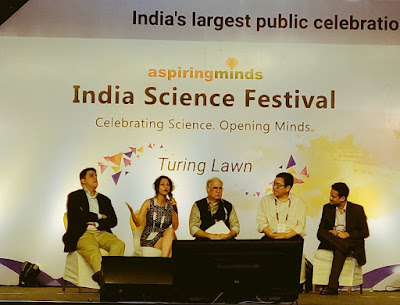Talk at Humboldt Berlin on Tech, Law and Access to Justice
 On 28th and 29th of November 2018, I participated and spoke at a workshop titled “The Future of Law: Technology, Innovation and Access to Justice” at the Humboldt University of Berlin. The workshop was organised by the Chair for Public Law and Comparative Law, Humboldt University of Berlin and the Friedrich Naumann Stiftung for Freedom. My talk was titled, "Above the law and below poverty: Databased obfuscations, activism and publicity from the global South." My talk argues that contrary to seeking to be protected through anonymity as the bulk of the current research alludes to, some of those at the margins may choose to put themselves at high risk by being visible and heard. The GDPR, rooted in the Western ideology of individual choice and rights, may have created a privacy universalism, begging the question of whether privacy is a privilege and a luxury. This talk draws from a decade of fieldwork and activism among vulnerable communities beyond the West to grapple with the question of whether privacy and activism are after all compatible.
On 28th and 29th of November 2018, I participated and spoke at a workshop titled “The Future of Law: Technology, Innovation and Access to Justice” at the Humboldt University of Berlin. The workshop was organised by the Chair for Public Law and Comparative Law, Humboldt University of Berlin and the Friedrich Naumann Stiftung for Freedom. My talk was titled, "Above the law and below poverty: Databased obfuscations, activism and publicity from the global South." My talk argues that contrary to seeking to be protected through anonymity as the bulk of the current research alludes to, some of those at the margins may choose to put themselves at high risk by being visible and heard. The GDPR, rooted in the Western ideology of individual choice and rights, may have created a privacy universalism, begging the question of whether privacy is a privilege and a luxury. This talk draws from a decade of fieldwork and activism among vulnerable communities beyond the West to grapple with the question of whether privacy and activism are after all compatible.Access to justice is understood as the ability for people to address their everyday legal problems, either through recourse to courts or other forums. It is estimated that globally, around 4 billion people live outside the reach of the law, and do not have the security, opportunity or protection to redress their grievances and injustices. Challenges of access to justice can manifest in multiple ways, these can include where courts and legal institutions are out of reach of litigants for reasons of costs, distance or even a lack of knowledge of rights and entitlements. It can also be caused because many judicial institutions are under-funded and as a result, there is poor infrastructure, inadequate staff and limited resources to meet the needs and demands of litigants who require such services. In many instances the text of law itself is riddled with complexities and that makes it difficult for it to be understood and used effectively. Access to justice is therefore an expansive concept that has symbolic, financial, informational and structural implications for fights against poverty, inequality, violence and a lack of development. This significance has been recognized in the United Nations Sustainable Development Goals that see access to justice as a key driver for building peaceful and inclusive societies.
A key focus of this conference is to understand how technology, seen as a disruptor in several industries and economies, can leverage innovation to introduce solutions to some of the most intractable justice sector problems. The German government, particularly through its Ministry for Economic Cooperation and Development, has also identified the vast potential of digitalization and specifically targets the promotion of human rights and political participation in its recently published “Digital Agenda”. The conference aims to bring together leading lawyers, judges, academics, activists, technologists and researchers to discuss ways in which advances in technology, can bring greater access, efficiency and effectiveness to justice sector reform.



Comments
Post a Comment